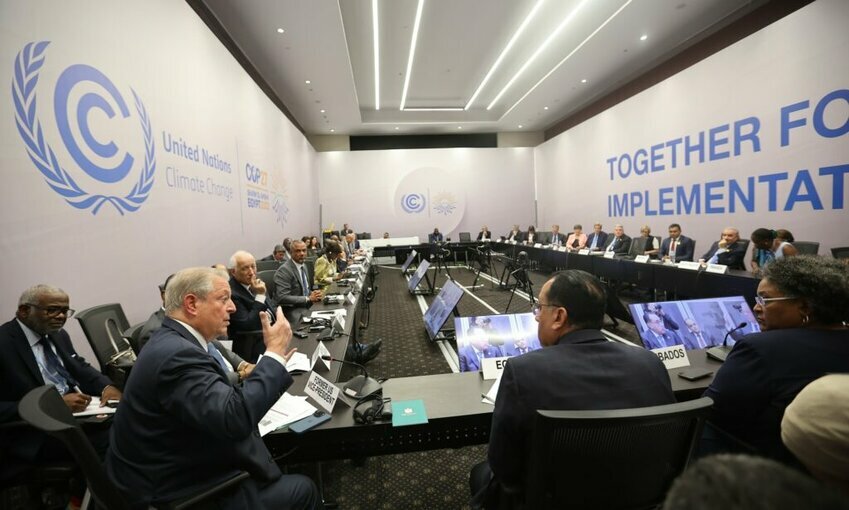 (Credit: COP27)
(Credit: COP27)COP27 drew to a conclusion with international delegates agreeing for the first time to provide developing nations with “loss and damage” for natural events, saw the United States and China reengage in climate talks, and made no concrete agreement on reining in fossil fuel use.
Representatives from nearly 200 countries negotiated the UN climate conference’s final statement late into the day on Nov. 19, 2022, after the event had officially ended. Financing emissions and climate objectives for developing nations was the primary focus of COP27 and coming to the loss and damage agreement is seen as progress for most in attendance.
The agreement essentially will provide payouts for developing nations that have suffered from significant natural events, such as floods, droughts, and wildfires, that could be seen as caused by warming from developed nations’ operations. Helping mitigate these impacts are considered key to reaching 2050 international net-zero goals.
The agreement does not say when the fund will be operational or how it will be financed. It still was lauded, especially by small and developing nations.
“The agreement to establish a loss and damage fund to assist communities that contribute the least to carbon emissions but bear the brunt of climate change is a huge achievement at COP27,” says Dr. Farah Naureen, Mercy Corps’ country director for Pakistan. “Anything less than this would have jeopardized trust in the climate negotiations and would have left countries like mine, Pakistan, paying the price.”
Naureen went on to say there are still many details to work out, including the need for public and other methods of financing. Naureen also says the effectiveness of the agreement remains to be seen.
According to CNN, the US and other developed nations have traditionally avoided such an agreement, worried it could open them up to liability from other countries. CNN says Climate Envoy John Kerry had said loss and damage was not the same thing as climate reparations.
“We have always said that it is imperative for the developed world to help the developing world to deal with the impacts of climate,” Kerry says in the CNN report.
Funding for developing nations was one of the main agenda items at COP27. It intended to address more than $100 billion that has long been pledged to developing countries for sustainability but has mostly fallen short. Some countries, such as the United Kingdom, did reaffirm or increased their commitments at the conference.
While financing for developing nations was a priority at the conference, there also was criticism of continued support for fossil fuels. In that regard, nothing substantial was made to phase out the use of fossil fuels.
The final COP27 text did call for phasing out coal power and some fossil fuel financing. However, some countries called for at least a phase-down of fossil fuel use.
NPR reported that Europe, small island nations, and India wanted language calling for a phasedown of fossil fuels. In the end, the statement just encouraged such measures, and the UN says “we need to massively invest in renewables and end our addiction to fossil fuels.”
At the conference, the EPA did announce strengthened proposed standards on methane emissions, which include requiring oil and gas companies to respond to third-party reports of leaks. The UN High-Level Expert Group on the Net-Zero Emissions Commitments of Non-State Entities also called to end financial support for fossil fuels.
Reuters reports that the oil and gas industry was more involved at COP27 than it was at COP26. Oil-producing country United Arab Emirates is the host of next year’s COP28.
Despite no significant fossil fuels action, there was a reaffirmation of maintaining the Paris Agreement’s 1.5-degree Celsius standard. That also comes with a lack of language following the conference specifically targeting emissions.
Finally, the US and China have agreed to continue climate talks after they were halted in the summer of 2022. The countries, which are the world’s largest emissions emitters, made waves at the end of COP26 with a public announcement that they would work together to curb emissions.
Last year, the countries pledged to especially address carbon and methane emissions. They also focused on renewable energy programs.
US President Biden and China President Xi Jinping met at G20, which happened at the same time as COP27 and committed to restarting talks. The CNN report says the countries met throughout the second week of COP27.